If you’ve been reading about concussion diagnosis and symptoms and feel confused, that’s pretty normal. Most advice about concussions feels vague. It’s hard to know what applies to you. And if you’re like most patients, you may be second-guessing yourself and unsure whether to see a doctor after your injury.
In this post, we’ll try to make it easier for you to know if you have a concussion and what options you have. Along the way, we’ll debunk some common myths about concussions and how you can tell if you have one.
Here’s a sneak peek at what we’ll cover:
Note: If you’re experiencing symptoms that won’t resolve after one or more concussions, you’re not alone and you’re not crazy. On average, our patients improve by 75% after treatment at our center specializing in post-concussion therapy. To see if you are eligible for treatment, sign up for a free consultation.
Data relating to brain function mentioned in this post may be from our first generation fNCI scans. Gen 1 scans compared activation in various regions of the brain with a control database of healthy brains. Our clinic is now rolling out second-generation fNCI which looks both at the activation of individual brain regions and at the connections between brain regions. Results are interpreted and reported differently for Gen 2 than for Gen 1 and averages are still forthcoming.
Signs and Symptoms of a Concussion
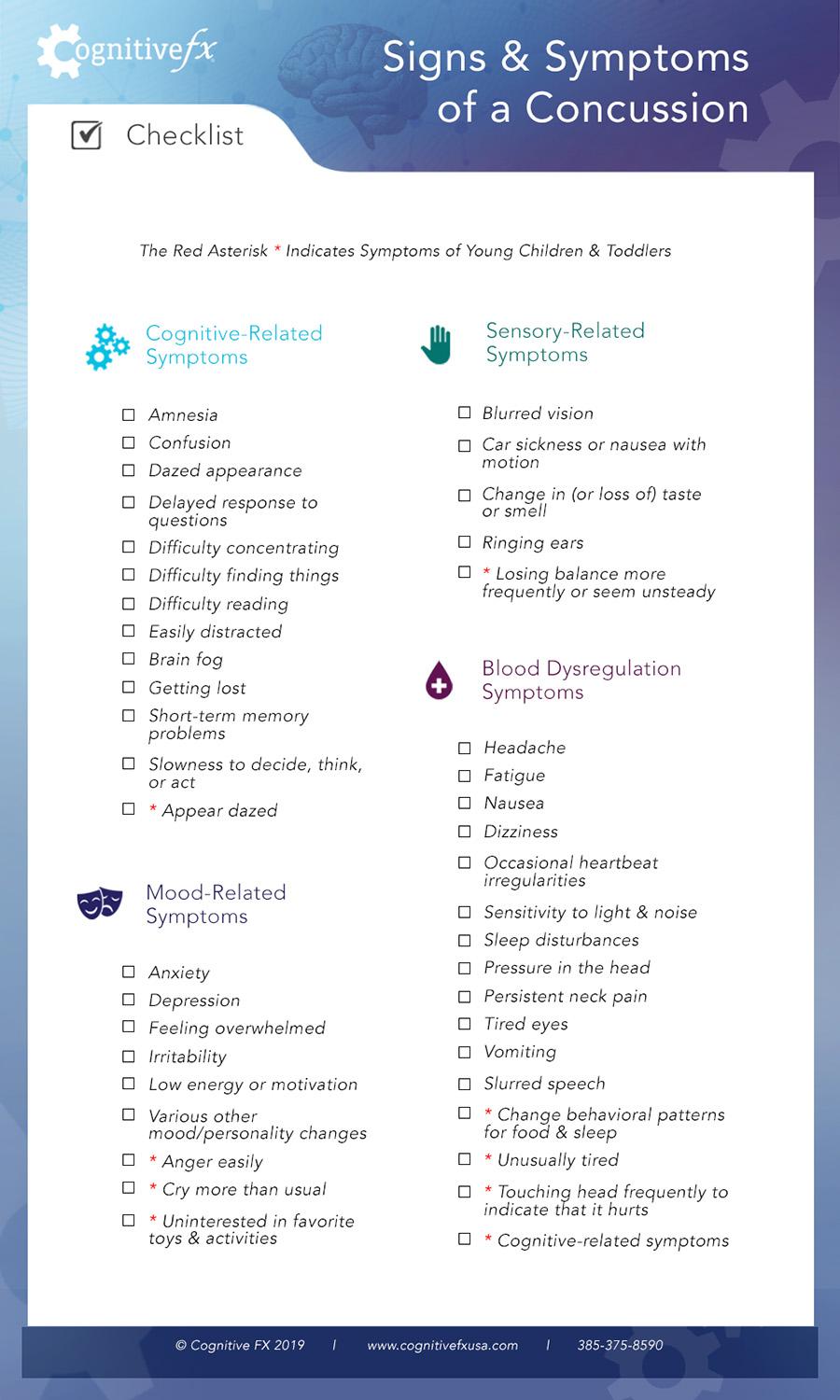
A concussion is a mild traumatic brain injury (mTBI) sustained after a blow to the head, whiplash, or jostling of the brain. That impact to the brain causes inflammation and may damage some brain cells, leading to concussion symptoms. If you a) experienced a hit to the head, whiplash, or brain jostling, and b) have one or more concussion symptoms, then it’s likely that you have a concussion.
Here are some of the most common symptoms of concussion in the days following injury:
As you can see, there are many different kinds of symptoms of a concussion (which makes sense when you consider that your brain controls everything you do!). Some of them have different ways of presenting, too. For example, one person with vision problems might have blurry vision while someone else has reduced peripheral vision and another simply gets headaches while trying to read.
And in young children, symptoms don’t look the same either (see starred items in the checklist image at the beginning of this section) because they can’t express what they feel as well as we can.
Further reading: How post-concussion symptoms present in children and adolescents
Signs of Severe Traumatic Brain Injury
Sometimes, a head injury is more than just a concussion. If you or the person you’re with experience any of these warning signs of serious head trauma, seek medical attention immediately at the nearest emergency department:
- Uneven pupil dilation
- A worsening headache that does not go away
- Drowsiness
- Loss of consciousness
- Extreme confusion
- Sudden personality changes or reckless impulsiveness
- Slurred speech
- Repeated vomiting
- Seizures or convulsions
- Significant clumsiness and/or dizziness
- Amnesia (about the event or otherwise)
- Clear, watery discharge from the nose or ears
- Bloody discharge from the ears
- Double vision
Common Causes of Concussion
Maybe it’s a sports injury. Maybe you tripped and slammed your head on the counter. Maybe you were driving without a seatbelt when you were rear-ended. Or maybe you got knocked around at the roller coaster park. From the most frightening to the most inglorious methods of getting a concussion, the answer is the same:
You cannot have a concussion unless you hit your head, experienced whiplash, or jostled your brain enough for it to crash against your skull.
If you did experience one of those three causes of head injuries, then your chances of having a concussion are high. That said, some situations are more likely to result in serious brain injury than others.
Crash into a tree snowboarding?
Hit your head in a motor vehicle accident?
Fall off a balcony?
Those situations — and others like them — are more likely to result in a severe TBI than, say, getting tackled during football. But having a less terrifying hit to the head doesn’t mean you should let your guard down. If you experience any symptoms of a severe traumatic brain injury (listed here), seek medical care immediately.
Frequently Asked Questions About Concussions

Many concussion myths are perpetuated by outdated information passed down in the family or even through health care providers who haven’t kept up with the latest concussion best practices.
Can I have a concussion if I didn’t black out?
Yes! Someone may have told you that it’s not a concussion without loss of consciousness. But the reality is that your symptom severity does not dictate whether or not you had a concussion. You don’t have to have memory loss, fainting, or any other major issue for it to be considered a concussion.
Only a few concussion patients black out during their injury. The vast majority stay conscious the whole time!
Can I have a concussion if I didn’t hit my head?
Yes, you can have a concussion if you didn’t hit your head directly. While many concussions are caused by a blow to the head, you can also get a concussion from whiplash or jostling. In those cases, the brain slams against your skull, temporarily damaging the cells and causing an inflammation response. It’s just as capable of causing symptoms as a physical hit to the head.
For example, we’ve treated people who experienced whiplash during a car accident. They didn’t hit their heads, but the damage to their brains was very real. Or, say you’re a figure skater, and you fall on your rear over and over. Those falls still jostle your brain a little bit over a longer period of time which could also result in a brain injury, even if you didn’t hit your head on the ice.
Further reading: Former figure skater finds relief from persistent posts-concussion symptoms
Can I have a concussion if I feel fine the next day?
Mild or no symptoms does not mean you don’t have a concussion. Some people don’t notice their symptoms immediately. And the symptoms may not be extreme — it’s possible that you’ll only experience a mild headache and moderate fatigue for a few days before getting back to normal.
Say you bump your head and feel totally fine afterward, and the people you’re with don’t notice any odd behavior. It’s probably not a concussion, but still has a chance of being one (especially if you’ve had repeated concussions in the past). Sometimes, when the brain is injured, you may not experience symptoms immediately. Every brain reacts differently, so it’s important to keep an eye on how you feel for several days after a blow to the head.
Also, keep in mind there’s no such thing as a “mild concussion.” Every concussion is, in technical terms, a mild traumatic brain injury. What makes it a “bad” concussion or not mainly depends on how much your brain is affected and how bad your symptoms are.
Can I have a concussion if my eyes look normal?
Yes. Most of the time, your eyes will not be a reliable source of diagnosis. That said, some baseline tests include eye-movement tracking that is capable of detecting a concussion. Unfortunately, baseline tests are not helpful unless you’ve taken them before your concussion. More on that in a bit.
So can your eyes ever indicate brain damage? They might. If both pupils are dilated, that could just be your body’s normal response to a stressful situation. If one pupil is dilated more than the other, that could indicate more serious brain trauma. It’s worth seeing a doctor immediately to rule out a traumatic brain injury.
Can I have a concussion if the MRI or CT scans didn’t show anything?
Yes! Most regular MRI and CT scans will not show concussion damage. They’re simply not designed to detect concussion damage.
Think of it this way: Imagine you’re looking into the window of a company. The lights are on, the building is intact, and the workers are present. Externally, it seems like the company is running well. But for the purposes of our example, we’ll say that the workers don’t get along, the company’s finances have been mismanaged, and the CEO just resigned amidst a scandal. It’s actually not doing well at all.
The view you get of the company by looking at appearances (i.e., is the building there, are there people in it, etc.) is like looking at your brain with a regular MRI: It can verify that your brain structures are present and undamaged. But a regular MRI can’t tell you how well that brain is using its resources and whether your neurons are communicating the way they need to (i.e., are the employees collaborating, is the CEO leading them well, etc.). For that, you’d need functional Neurocognitive Imaging (fNCI) — a test we’ll talk about more in the next section.
Further reading:
Is there a test that can prove I have a concussion?
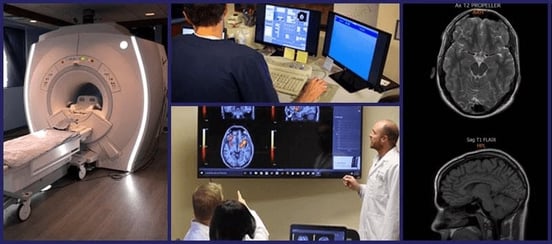
There is no gold standard when it comes to concussion testing. Many doctors, for lack of better options, will order an MRI or a CT scan. Unfortunately, neither of these tests can reliably detect a concussion, although they can rule out more serious causes of your symptoms. For example, if you have a tumor, brain bleed, or aneurysm, the scans should detect that.
If it’s been several months after your injury and you’re still experiencing symptoms, then we recommend a test we use at Cognitive FX: functional neurocognitive imaging (fNCI). It’s a special kind of functional MRI that looks at how your brain uses its resources in response to stimuli.
This is as opposed to a regular MRI, which only looks at brain structure. It wouldn’t matter what you were thinking of when you got the standard MRI, the results would be the same. But for a functional MRI, the scan will change dramatically based on which regions of your brain are currently active. This distinction is critical.
During the fNCI we administer, patients complete a set of cognitive tasks. We use the scans to see which brain regions are involved in those tasks. Post-concussion patients exhibit clear patterns of hypoactivity (lower functioning than expected) in the brain regions affected by their injury. When patients meet established criteria, we can say with a great degree of certainty that they suffer from post-concussion syndrome.
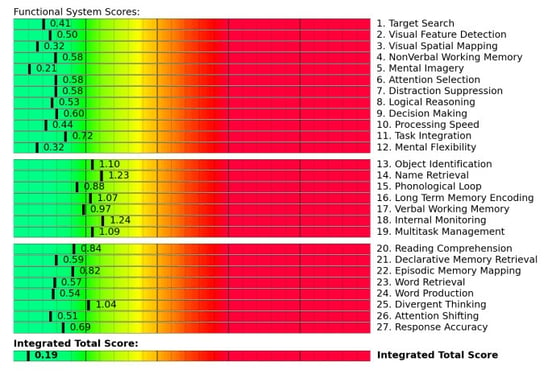 An example results summary for a healthy patient. fNCI offers insight into which brain regions and processes are struggling post-concussion.
An example results summary for a healthy patient. fNCI offers insight into which brain regions and processes are struggling post-concussion.
To learn more about other tests used during post-concussion diagnosis, please see our article on tests for post-concussion syndrome.
Baseline Testing
If you play contact sports (or are in other situations that increase your likelihood of sustaining a concussion), you could complete a baseline test. Some sports medicine offices and concussion clinics offer it. A baseline test establishes what your normal functioning level is. It usually involves some basic cognitive and reaction time tests and may also involve some balance testing.
If you get a concussion after taking a baseline test, you can retake the test immediately after injury. If your scores go down significantly, then it’s likely from your concussion.
That said, the test isn’t perfect — if it isn’t administered in exactly the same way, for example, you might not get accurate results. Some of the best baseline tests include an eye-tracking assessment. It’s worth seeing if a clinic in your area offers baseline testing with eye-tracking included.
Unfortunately, baseline testing is only helpful if you do it before your concussion. After your concussion, it’s too late to be useful.
Read more about baseline testing from the Centers for Disease Control and Prevention (CDC) Heads Up program.
What to Do if You Have a Concussion

If you think you have a concussion, don’t return to a full work week or school week right away. The best recovery regimens involve a balance of exercise, light activity, and rest. You can slowly scale up to your previous schedule based on symptoms.
You may also want to see a doctor, both for diagnosis and for help navigating recovery. In this section, we’ll go over some pointers for recovery, along with when to see a doctor.
Active Recovery
If you sustained a concussion playing sports, do not return to play until you have fully recovered from your concussion. People who have sustained one concussion are more susceptible to getting another, especially when they haven’t yet recovered from the first. Although rare, you would also risk second impact syndrome, a life-threatening condition caused in a small percentage of people who sustain a second concussion while not yet recovered from the first. And if you do sustain a second concussion before the first is resolved, visit the emergency room immediately so they can check for brain swelling and other serious complications.
Aside from that, the worst thing you can do is something called “cocooning.” Cocooning involves resting all day in a dark room while avoiding all activity (including screens). Many well-meaning doctors still give this medical advice because it’s what they were taught in school. But research over the past decade has shown that cocooning can actually increase your likelihood of long-lasting symptoms.
Here’s what you can do instead:
- Light physical activity for 30 minutes per day (at whatever level you can tolerate without skyrocketing symptoms).
- Cognitive activity like puzzles, reading, etc.
- Restful, calming activities (such as listening to binaural beats, medication, etc.).
- Normal activities for you, but at a lower intensity than usual and as tolerated. Some video games are fine, but limit overall screen time.
- Gradual return to work or school.
.jpg?width=1999&height=1333&name=How%20Do%20You%20Know%20If%20You%20Have%20a%20Concussion%20(3).jpg) Cardio is an important part of concussion recovery.
Cardio is an important part of concussion recovery.
Do your best to get plenty of sleep (but if you have a hard time sleeping, you’re not alone — altered sleep patterns and poor quality rest from sleep are common symptoms. This post might help.)
If you need over-the-counter pain medicine in the first two days following injury, avoid Ibuprofen and other NSAIDs as they might increase the risk of brain bleeding. Instead, use Tylenol until 48 hours have passed.
We describe the acute concussion recovery process in depth in this post on how to treat a concussion. If you’d like extra guidance on how to work out safely, you can read our guide to post-concussion exercise.
Visit a Doctor
Seeing a doctor is not always necessary if you’ve had a concussion. That said, it depends on your tolerance for risk: If you want to be absolutely sure that you haven’t sustained a worse injury than a concussion, see a doctor. If you have unevenly enlarged pupils, or any other symptoms of a severe traumatic brain injury, you should seek medical attention immediately.
Otherwise, going to the doctor really depends on what you need. If your symptoms are mild and you have someone at home to watch over you, then seeing a healthcare professional may be unnecessary. Some doctors can’t offer much for concussion patients, while others can put them in a proactive rehabilitation program to help them recover more quickly.
See our post on which doctors can help with head injury symptoms and how for more information.
How to Get Treatment for Persistent Symptoms

If it’s been a few weeks since your injury and you’re still experiencing symptoms, it may be time to consider a concussion treatment clinic. We’ve written a full post on how to find a good clinic that you can use in your search.
Post-concussion syndrome is when you have long-lasting symptoms after a mild traumatic brain injury. Most of the time, these symptoms will not go away without treatment. The condition can be permanent, but after treatment at our clinic, 95% of our patients experience statistically verified restoration of brain function.
.jpg?width=1999&height=1333&name=How%20Do%20You%20Know%20If%20You%20Have%20a%20Concussion%20(5).jpg)
You can read more about our multidisciplinary treatment team and process — which involves neuromuscular and physical therapy, occupational therapy, sensorimotor therapy, neurointegration therapy, cognitive therapy, psychotherapy, and more — here: Treatment for post-concussion syndrome.
To learn more about how we can help you, sign up for a consultation with our medical staff.




 An example results summary for a healthy patient. fNCI offers insight into which brain regions and processes are struggling post-concussion.
An example results summary for a healthy patient. fNCI offers insight into which brain regions and processes are struggling post-concussion.
.jpg?width=1999&height=1333&name=How%20Do%20You%20Know%20If%20You%20Have%20a%20Concussion%20(3).jpg) Cardio is an important part of concussion recovery.
Cardio is an important part of concussion recovery.
.jpg?width=1999&height=1333&name=How%20Do%20You%20Know%20If%20You%20Have%20a%20Concussion%20(5).jpg)

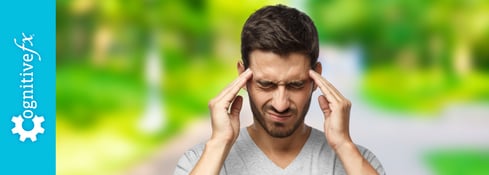

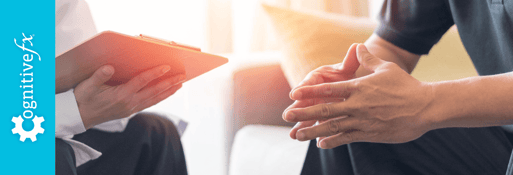


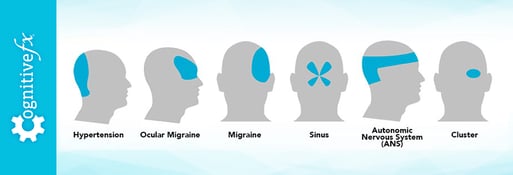
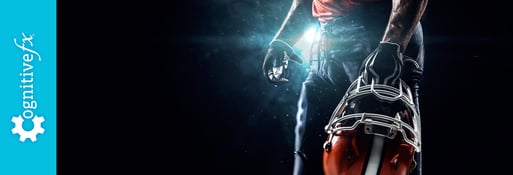
.png?height=175&name=Concussion%20Symptoms%20Causes%20%26%20How%20Long%20They%20Last%20%20(3).png)